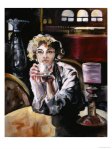 One of the questions that I was asked to consider this week as I worked my way though the material I’ve been sent on The Comedy of Errors was what, if any, examples I could think of amongst current ‘literature’ that continued the traditions of the Medieval Morality Plays in a modern form. The suggestion made in the text was that of the Western with its (normally) diametrically opposed good guy versus bad guy.
One of the questions that I was asked to consider this week as I worked my way though the material I’ve been sent on The Comedy of Errors was what, if any, examples I could think of amongst current ‘literature’ that continued the traditions of the Medieval Morality Plays in a modern form. The suggestion made in the text was that of the Western with its (normally) diametrically opposed good guy versus bad guy.
Well, as you will know if you’ve read the last entry here, I’m beginning to develop a habit of arguing with the materials that I’ve been sent and I wasn’t too sure about this response either. I can see the good guy, bad guy argument, but it seems to me that a much more fundamental issue where the Morality Plays are concerned is the question of choice – do I choose to be good or do I choose to be bad and if I choose to be bad is there any hope of redemption.
With this in mind, I toyed for a while with the idea of Star Wars and the choices which Luke and Darth Vedar have to make, but then I suddenly realised that in fact there was a much more obvious answer, Harry Potter.
The question of choice is central to the Harry Potter sequence. It is there from the very beginning when Malfoy approaches Harry on the train and tries to recruit him to the forces of evil.
‘You’ll soon find out some wizarding families are much better than others, Potter. You don’t want to go making friends with the wrong sort. I can help you there.’
Harry rejects Malfoy’s offer of ‘help’ and reinforces his choice under the Sorting Hat.
Harry gripped the edges of the stool and thought, ‘Not Slytherin, not Slytherin.’
‘Not Slytherin, eh?’ said the small voice. ‘Are you sure? You could be great, you know, it’s all here in your head, and Slytherin will help you on the way to greatness, no doubt about that – no? Well, if you’re sure – better be GRYFFINDOR!’
Just in case we haven’t realised the importance of this choice, Dumbledore makes it very plain when Harry agonises over the similarities between himself and Voldemort and questions whether or not the hat has made a mistake.
‘It only put me in Gryffindor,’ said Harry in a defeated voice, ‘because I asked not to go in Slytherin…’
‘Exactly,’ said Dumbledore, beaming once more. ‘Which makes you very different from [Voldermort]. It is our choices, Harry, that show what we truly are, far more than our abilities.’
Throughout the sequence the importance of choice is emphasised again and again. Think, for example of the moment in the Shrieking Shack where Harry chooses not to kill Wormtail and the consequences inherent on that choice. And, of course, we are reminded of it right at the very end as Harry says goodbye to his son, Albus, on the platform at King’s Cross. As Albus agonises over the possibility that the Hat might place him in Slytherin Harry tells him,
‘if it matters to you, you’ll be able to choose Gryffindor over Slytherin. The Sorting Hat takes your choice into account.’
‘Really?’
‘It did for me,’ said Harry.
So, if the question of choice is central, then what about the question of redemption? There we have to turn to Snape. For if ever there was a character in literature who has turned his back on the bad, given himself over to the good, despite what it costs him, and who is eventually redeemed by his actions it is Severus Snape. And, he does it without any expectation of reward. Indeed, he refuses to allow Dumbledore to tell anyone of what he has done and why. But, in the end he is willing to give his life for the child he loathes, the son of the man he hates, because of love, because Harry is also the son of Lily Evans. He is redeemed by his action and has his final reward. The last thing he sees as his life drains away is the one feature that Harry has inherited from his mother, her beautiful green eyes.
Realising the link between Harry Potter and the Medieval Morality Tales has made me think again about the value of those earlier texts. I read several during the week and to some extent passed them over as not particularly relevant to me or to the current world, mainly, I suspect, because they are placed in such a strict Christian context. However, when I think about what they are saying through the context of Rowling’s work I find myself acknowledging that the medium is not always the message. That sometimes the medium can get in the way of the message. Whatever tradition we come from, whatever our cultural perspective, our choices are what define us and the idea that we can be ‘redeemed’, that we can recognise the folly of earlier choices and do something to put those choices right, is for me at least, serious grounds for hope.